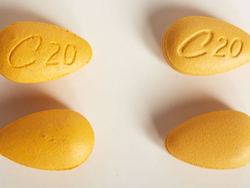 |
| Eli Lilly's oft-copied erectile dysfunction medicine Cialis. The counterfeit pills are on the left.--Courtesy of Eli Lilly. |
Eli Lilly ($LLY) has been combating counterfeiters for more than 10 years, but now, the drugmaker has decided it's time to up its efforts. Its latest move: Investing $110 million into stamping unique codes and serial numbers on every drug package it sells worldwide, making them trackable--and hopefully stumping crafty counterfeiters in the process.
According to the Indianapolis Star, the program will allow Lilly to verify the origin of each shipment as it moves along the supply chain, all the way from manufacturing facility to patient. The bulk of the spending will come over the next two years as the company works to implement the new system, adding to the millions the Indianapolis-based drugmaker already spends on anti-counterfeiting measures.
The program also positions Lilly well as the U.S. rolls out requirements of a national track-and-trace program. Under a new law, drugmakers are required to begin tracking prescription drug lots in 2015. Two years later, industry players must begin assigning serial numbers to individual "saleable units" of every prescription product sold in the U.S., government deadlines mandate.
It's not an easy program to implement, as Lilly's serialization plans show. Lilly is installing computer-controlled, high-speed stamping equipment in 40 packaging lines globally; the company has already spent $5 million designing and testing the machinery on a mock packaging line in Indianapolis, the Star reports.
"It's not necessarily something pharma companies are asking to do, but we certainly see the value in it," Bryan Orton, Lilly's director of serialization and product protection, told the Star.
So Lilly's not waiting to get started. As the Star notes, the company--which makes oft-copied erectile dysfunction med Cialis--has been a victim of counterfeiting multiple times, with illegal drug operations growing more and more sophisticated. The episodes led CEO John Lechleiter to make anti-counterfeiting a priority, and the company now keeps a team of 7 drug investigators stationed on three continents, as well as an authentication lab in its home city where 6 chemists test hundreds of suspect drugs per year.
Lilly has also helped bring industry-wide attention to the problem, becoming one of four members to found the Alliance for Safe Online Pharmacies in 2009. And last spring, it was one of 29 companies to provide investigative agency Interpol with $5.9 million over three years to train local authorities around the world on how to weed out fakes.
And it's not hard to see why. Counterfeiters are now targeting life-saving drugs for conditions like cancer and heart failure, potentially seriously harming patients and endangering companies' brands. That's not to mention the obvious threat to sales that's present when consumers pick up a knockoff version in place of the real thing. And with Lilly expecting a particularly dismal financial year, it's a risk its top line can't take.
- get more from the Star
Special Report: The top 10 pharma companies by 2013 revenue - Eli Lilly